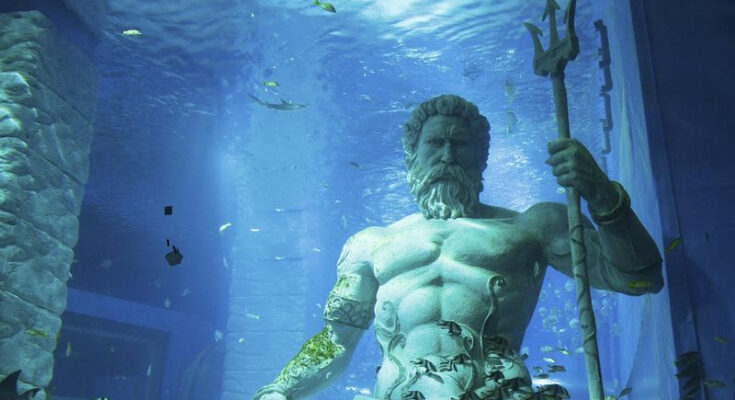Authorities in Mexico have issued a “closure” order for a 10-foot-tall (3-meter) aquatic statue of Poseidon, the Greek god of the sea, which was installed in May in the Gulf of Mexico near the town of Progreso, Yucatan.
The Associated Press (AP) reports that Mexico’s environmental protection agency said last week that the statue, which appears to show an angry trident-wielding Poseidon “rising” from the sea a few meters from the beach, lacked permits.
In the few months it has been up, tourists have gathered to take pictures of themselves with it as a striking background.

Why Indigenous groups in Mexico are against the Poseidon statue
But it was symbolically “closed” Thursday — and could be removed altogether — after a group of activist lawyers filed a legal complaint saying the statue of the Greek offended the beliefs of local Maya Indigenous groups who prefer their own local god of water, known as Chaac.
Chaac is the name of the Maya god of rain, thunder, and lightning. With his lightning axe, Chaac strikes the clouds, causing them to produce thunder and rain. Chaac corresponds to Tlaloc among the Aztecs.
“Poseidon is a Greek god who is alien to our Maya culture,” according to the legal complaint filed recently against the statue. “I have a human right for my Maya culture to be preserved.”

Carlos Morales, whose Indigenous Strategic Litigation group brought the complaint, told AP he wants the Poseidon statue removed.
“I want Poseidon removed from the beach at Progreso because it is foreign to the Maya culture, and because it did not meet the requirements” of getting an environmental permit, he said.
Critics of the statue cite a series of recent storms in and around the Gulf — Tropical Storm Alberto in June and Hurricane Beryl this week — as proof that Chaac, a fanged, hook-nose deity who isn’t quite as Instagram-friendly as Poseidon, is angry.
Poseidon: God of the sea
God of the sea, rivers, storms, earthquakes, bulls, and horses, Poseidon occupies a large amount of ancient Greek mythology, literature, and theology, as well as multiple appearances in modern pop culture.
He had an unpredictable temperament that reflected his domain and could be tranquil or fatally tempestuous as per his natural powers and animal allegories.
Poseidon is associated with many evil and abusive giants and dragons. This affinity with various mythological monsters likely preceded Ionians’ associations of the god with the sea.
The origins of god’s name, “Posei-don,” are yet unclear although the most prominent theory breaks it down into two parts, the first of which means “husband” or “lord” (Greek πόσις, posis) and, the second of which means “earth” (δᾶ, da, the Doric form for γῆ, gaia). In other words, the meaning of this would be something along the lines of lord, or spouse, of the earth.
Related: Poseidon: The Almighty Greek God of the Sea



